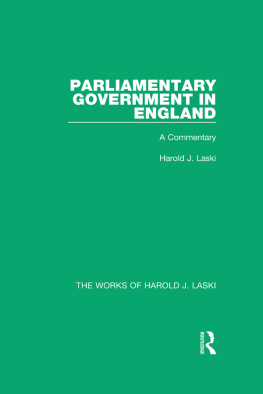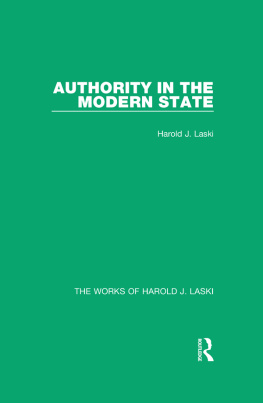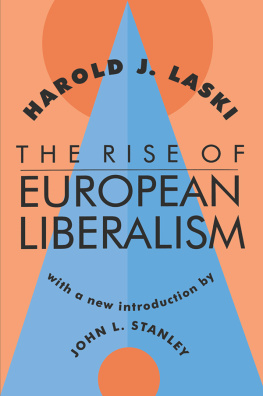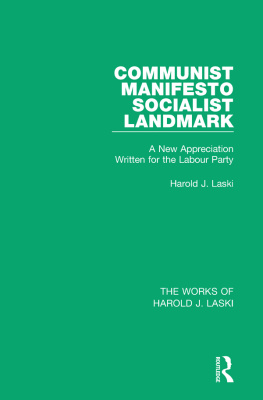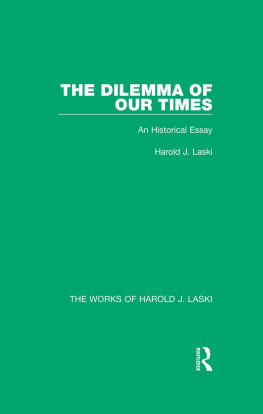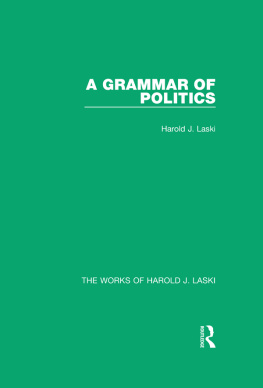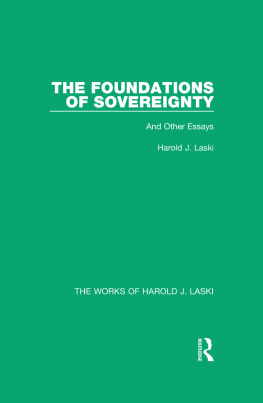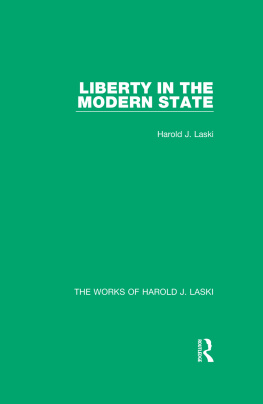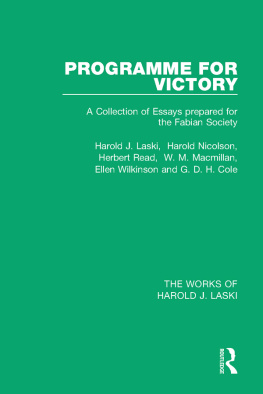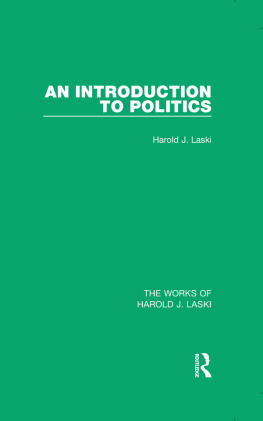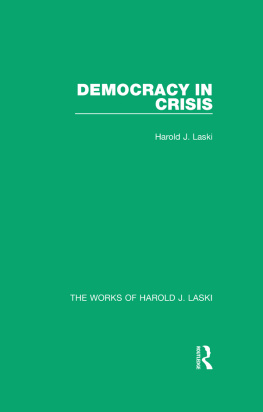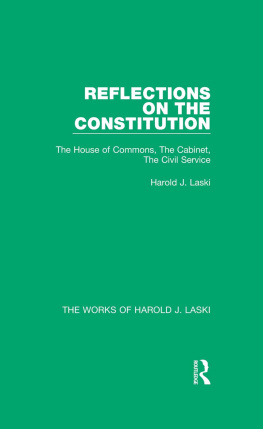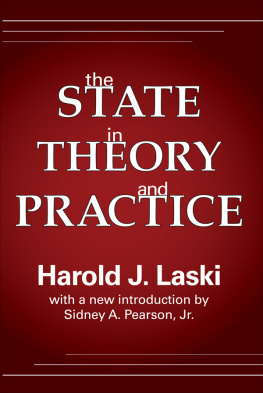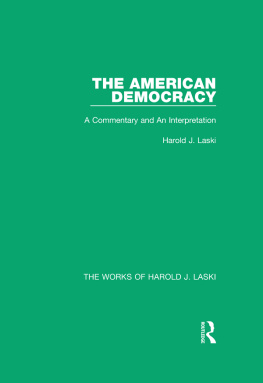THE WORKS OF HAROLD J. LASKI
Volume 9
PARLIAMENTARY GOVERNMENT IN ENGLAND
PARLIAMENTARY GOVERNMENT IN ENGLAND
A Commentary
HAROLD J. LASKI
First published 1938 by George Allen & Unwin Ltd
This edition first published in 2015
by Routledge
2 Park Square, Milton Park, Abingdon, Oxon OX14 4RN
and by Routledge
711 Third Avenue, New York, NY 10017
Routledge is an imprint of the Taylor & Francis Group, an informa business
1938 George Allen & Unwin Ltd
All rights reserved. No part of this book may be reprinted or reproduced or utilised in any form or by any electronic, mechanical, or other means, now known or hereafter invented, including photocopying and recording, or in any information storage or retrieval system, without permission in writing from the publishers.
Trademark notice: Product or corporate names may be trademarks or registered trademarks, and are used only for identification and explanation without intent to infringe.
British Library Cataloguing in Publication Data
A catalogue record for this book is available from the British Library
ISBN: 978-1-138-81912-2 (Set)
eISBN: 978-1-315-74273-1 (Set)
ISBN: 978-1-138-82209-2 (Volume 9)
eISBN: 978-1-315-74260-1 (Volume 9)
Publishers Note
The publisher has gone to great lengths to ensure the quality of this reprint but points out that some imperfections in the original copies may be apparent.
Disclaimer
The publisher has made every effort to trace copyright holders and would welcome correspondence from those they have been unable to trace.
PARLIAMENTARY
GOVERNMENT IN ENGLAND
A Commentary
by
HAROLD J. LASKI
London
GEORGE ALLEN & UNWIN LTD
FIRST PUBLISHED IN 1938
SECOND IMPRESSION 1945
All rights reserved
PRINTED IN GREAT BRITAIN BY
HENDERSON AND SPALDING
LONDON, W. I
TO MY FRIEND
MAX LERNER
WITH WARM AFFECTION
IT is important for me to emphasize that this book is not a formal description of the working of parliamentary government in England, but, essentially, as its sub-title states, a commentary limited to certain aspects of its working. I have tried, as best I can, to deal with those aspects of its working which are most relevant to the pressing problems of our time.
I owe many debts to friends for help in writing it. Among the dead, Lord Haldane and Mr. Arthur Henderson were good enough to discuss with me some of the problems here treated, on many occasions; and I have, I hope, learned a good deal from Graham Wallas in long years of eager colleagueship. Among the living, I should like particularly to mention Mr. and Mrs. Sidney Webb, to whom, like all of my generation, I owe an unlimited debt, and Dr. W. I. Jennings whose work on Cabinet Government has already taken its place as the classic work on the subject. None of them, of course, has any responsibility for the views I have expressed. Perhaps I may add that parts of the book have benefited greatly from the friendly, if vigorous, criticisms of my students in the London School of Economics and Political Science.
H. J. L
July 3, 1938
LITTLE BARDFIELD, ESSEX
1.
No system of representative government has a history so continuous or so successful as that of Great Britain. It was born of a revolution which, in any real sense, may be said to have lasted almost fifty years. Yet if it was the deposit of a grim civil war, for two hundred and fifty years all its fundamental changes have since been effected by peaceful compromise. It has stood the strain of two wars of world importance; and it has been able to adapt itself to a condition in which the form of its political institutions has been successfully adapted to the substantive distribution of its economic power. In the century and a half of its modern history, the government of France has been reshaped by three violent revolutions; while the constitution of the United States was challenged, half-way in its evolution, by four years of civil war. If we date the history of representative government in Germany and Italy from 1870, the one lasted sixty-three, the other for fifty-two years.
The contrast is, on any showing, a striking one; and it is tempting to attribute it, as eulogists are wont to do, to some special British genius for the difficult art of self-government. That explanation, however, is an unsatisfactory one, since, obviously, it is a deduction from the history rather than a principle informing it. A passion for simplicity usually works havoc with political philosophers; and it is rare indeed for a phenomenon so complex as the success of the British government to be capable of explanation in terms of any single principle. Explanations which base themselves upon some supposed virtue in a national character rarely deceive any save those who are responsible for their making. Anyone who compares the impression produced by Englishmen upon Frenchmen in the seventeenth and eighteenth centuries respectively will recognize at once that judgments of national behaviour are always a dangerous enterprise. There is a presumption in them both of unity and objectivity which rarely coincide with the facts themselves.
The prerequisites, as Bagehot called them, of successful representative government are, indeed, both manifold and complex. It requires something more than intelligence and virtue. It presupposes a body of citizens who are fundamentally at one upon all the major objects of governmental activity; so fundamentally at one, it may be added, that the thought of conflict as a way of change is incapable of entering the minds of more than an insignificant portion of the nation. It requires, in the second place, a sense in the nation that no single class of any importance in the community is permanently excluded from power. For it has been not less true of the British than of other peoples, that the possession of power over a long period is corrupting in its nature; so that, in the long run, exclusion from power tends naturally to mean exclusion from benefit also. The rule of an aristocracy has always meant rule in the interest of that aristocracy; the rule of business men has always taken a narrow view of the interests both of agriculture and the poor. Unless a body of men who feel that their place in the society is, granted that they are numerous enough, either certain to receive consideration or, alternatively, that its refusal will jeopardize the position of those in office, they are unlikely, if the object involved is one to which they attach any profound consideration, to acquiesce at all easily in the maintenance of social peace.
A third condition of successful representative government is that it should be built upon widely diffused habits of tolerance throughout the nation. Men who are to live together peacefully must be able to argue together peacefully. They must not run to suppress criticism of things as they are; rather they must be willing, if pressed, to invite its examination. They must refrain from pressing upon a significant minority principles of legislation by which the latter is outraged. Without this tolerance there is no prospect in the society of compromise; and every subject of division then becomes a high-road to disruption.

